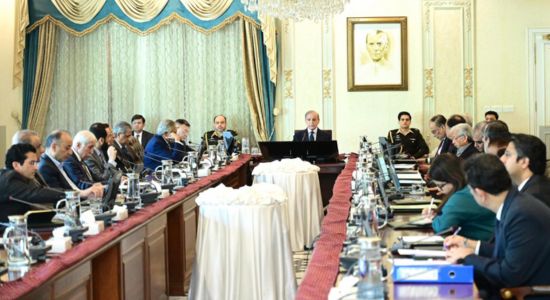ISLAMABAD, Jan 07 (NNI): The Federal Cabinet has declared the infrastructure of the Federal Board of Revenue as critical under the Pakistan Electronic Crimes Act 2016 to further protect the sensitive data of the FBR.
Approval to this effect was given by the Federal Cabinet, which met in Islamabad today with Prime Minister Shehbaz Sharif in the chair.
This step will further help protect the board’s sensitive data from cyber-attacks, including hacking or any kind of illegal intervention.
The Cabinet also extended the temporary operating permit for weekly frequencies of the international airline Fly Dubai’s flights from Lahore and Islamabad to Dubai and vice versa from the fourth of the current month to the third of the next month.
The meeting was briefed about public sector imports and exports of eleven ministries and divisions via Gwadar Port. Seeking comprehensive reports from all the ministries, Shehbaz Sharif directed to ensure sixty percent of all public sector imports and exports via Gwadar Port without any discrimination.
The Federal Cabinet was briefed that hundred percent enforcement of e-office in twenty-one ministries and divisions has been ensured. It was further stated that the use of paper has been discontinued in the communication among all federal ministries and divisions since the first of this month.
E-office is being used for all file movements and communications. It was informed that the enforcement of e-office will not only save time, but also benefit the national exchequer in terms of stationery and petrol. With the implementation of e-office, the processing time of summaries in the Prime Minister’s Office has now been reduced to a maximum of three days.
Besides, the Federal Cabinet exempted the procurement of refurbished chrome books from Public Procurement Regulatory Authority Ordinance Section 21-A. However, the Prime Minister instructed to ensure a third-party audit in the procurement of chrome books.
The Cabinet consented the signing of a Memorandum of Understanding between the Board of Investment and Shandong Ruyi Group of China for the establishment of textile parks. It also approved the signing of an MoU between the Diplomatic Academy of Serbia and the Foreign Service Academy of Pakistan.
The Cabinet allowed the current forty-six Private Hajj Operators to undertake arrangements for this year’s Hajj. However, it instructed to take all court cases regarding the Private Hajj Operators to their logical conclusion.
Meanwhile, according to a press release issued after the meeting, the Federal Government of Pakistan has embarked on a bold and transformative rightsizing initiative to streamline its operations, eliminate redundancies, and reallocate resources for better public service delivery.
Under the leadership of the Prime Minister and supervision of the Finance Minister, a High-Powered Committee was established on June 21, 2024, which reflects the government’s commitment to fiscal responsibility, operational efficiency, and citizen-centric governance.
The recommendations of the Committee are based on the merit and needs of the Departments and positions.
Key Objectives of the Rightsizing Initiative: Optimizing Government Functions: Identify functions that can be outsourced or privatized while maintaining public benefit; Eliminate overlaps and duplication, particularly in post-devolution areas with provinces; and Enhance value for public spending through efficiency reforms, including digitization.
Comprehensive Review of Federal Entities: The scope includes 43 ministries/divisions and nearly 400 attached entities; and Assess each function’s relevance, impact, and potential for public-private partnerships.
Strategic Phased Implementation: Divide the initiative into structured waves to minimize disruption: Wave I: Six ministries are under implementation, including; Ministry of Kashmir Affairs + GB; SAFRON; Ministry of IT & Telecom.
Ministry of Industries & Production; Ministry of National Health Services, Regulations & Coordination and CADD; Wave II: Five ministries are under implementation, including; Ministry of Science & Technology; Commerce Division; Housing & Works; and National Food Security & Research.
Wave III: Currently under review, covering; Federal Education and Professional Training; Information & Broadcasting; Heritage; Finance Division; and Power Division.
All Waves include 43 Ministries, analysis and implementation plan of which to be concluded during the course of this fiscal year.
Financial Consolidation: Recommendations address the Federal Government expenditure (PKR 876 billion).
Key Decisions and Outcomes. Streamlined Government Structure: Over 150,000 vacant posts (60%) will be abolished or declared redundant; Contingency roles and lower-grade positions will be significantly reduced; Non-core services like cleaning, plumbing, and gardening will be outsourced.
Ministry-Specific Outcomes: Entities to be reduced from 80 to 40 as following: Kashmir Affairs, SAFRON merged, CADD abolished: from 8 entities to 4; IT & Telecom: from 11 to 10; Industries & Production: from 31 to 6; National Health Services: from 30 to 20.
Enhanced Service Delivery: Citizens will benefit from faster, more efficient services enabled by digitization and improved governance structures.
Regulatory Reforms: Proposed amendments to the Civil Servants Act to align governance practices with modern needs.
Regular updates will keep citizens and stakeholders informed, ensuring transparency and accountability. This initiative sets a new standard for responsible governance and paves the way for a leaner, more responsive public sector aligned with the nation’s development goals. NNI








































